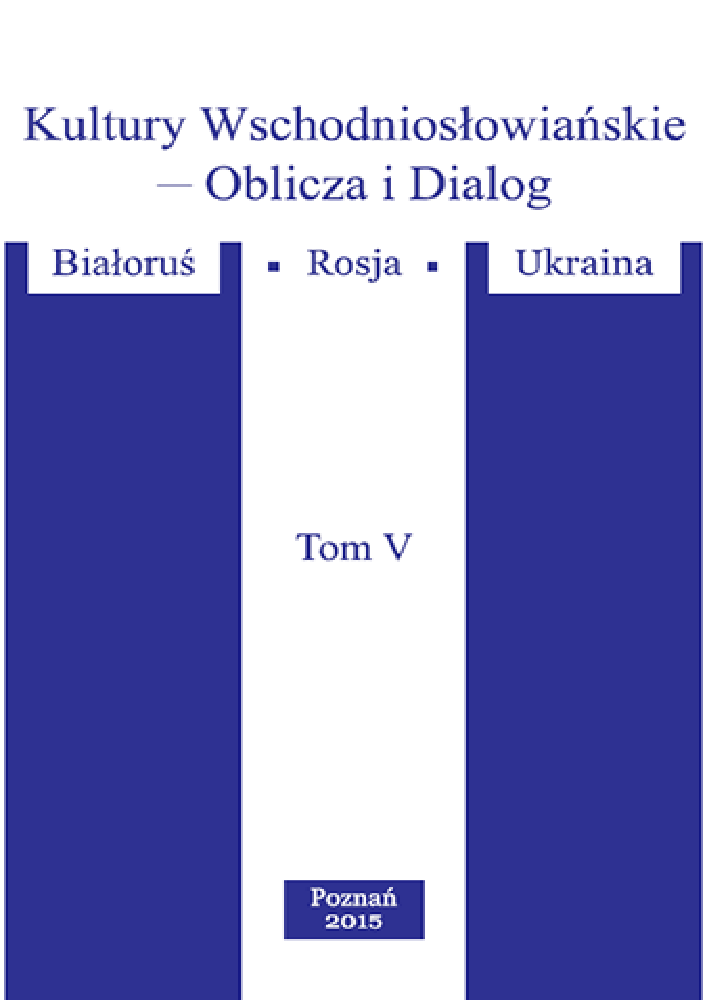Abstrakt
The emphasis is placed on the main character’s personal, national and academic identity. A university professor and a linguist, the protagonist constructed his identity through combining the elements of Sovietness, Englishness, and Ukrainianness. While focusing on the protagonist’s identity quest, the author also identifies historical context of the novel, which is rooted in Ukrainian socio-historic reality throughout the 1950s-2010s.
Bibliografia
Andrejčik, Marko. Ìntelektual âk geroj ukraïnsʹkoï prozi 90-h rokiv XX stolittia. Per.z angl. Ìgora Andrušenka. Lʹvìv: LA «Pìramìda», 2018.
Bauman, Zig̀munt. Plinnì časi: žittâ v dobu nepevnostì. Per. z angl. Antona Marčinsʹkogo. Kiïv: Kritika, 2015.
Beller Manfred, Leersen Joep (eds.). Imagology: The Cultural Construction and Literary Representation of National Characters. A Critical Survey. Amsterdam–New York:Rodopi, 2007.
Bereza, Ì.Û. “Vìddzerkalennâ estetičnih potreb ìntelìgencìï v sučasnìj prozì.” Naukovì pracì. Serìâ:Fìlologìâ. Lìteraturoznavstvo, 180/192 (2012): 6-9.
Berezìna, Darina. Fakulʹtet. Mikolaïv, 2018.
Blashkiv, Oksana. “Vagaries of (Academic) Identity in Contemporary Fiction.” Journal of Education Culture and Society, 9/1 (2018): 151-160. Web 26.01.2019. <https://jecs.pl/index.php/jecs/article/view/10.15503jecs20181.151.160>
Blaškiv, Oksana. “Istoričeskie perepetii skvozʹ prizmu ukrainskogo universitetskogo romana.” Conversatoria Litteraria, XII (2018): 135-149.
Černecʹkij,Vìtalìj: «Lìteraturì vlastivì pevnì sinusoïdnì kolivannâ», <http://litakcent.com/2015/09/15/vitalij-cherneckyjliteraturi-vlastyvi-pevni-synusojidni-kolyvannja/>.
Collins M. “The Fall of the English Gentlemen: the National Character in Decline, c.1918-1970.” Historical Research, 75/187 (2002): 90-111. Web 26.01.2019. <http://nbuv.gov.ua/UJRN/Npchdufl_2012_192_180_3>
Dalton-Brown, Sally. “Is There Life Outside of the Genre of the Campus Novel? Academic Struggles to Find a Place in Today’s World.” The Journal of Popular Culture, 41/4 (2008): 591-600.
Dnìstrovij, Anatolìj. Drozofila nad tomom Kanta. L’viv: Piramida, 2010. [Дністровий, Анатолій. Дрозофiла над томом Канта. Львів: Піраміда 2010.]
Donskìs, Leonìdas. Zbentežena ìdentičnìstʹ ì sučasnij svìt. Kiïv: Fakt 2010.
Josipìv, Ìgor. Unìversitet. Lʹvìv: Pìramìda, 2007.
Kuzʹmenko, Oksana. Obraz «strahu» âk etnokonstanta folʹklornih narativìv pro ìstoričnìdrami peršoï XX st. V: Socìalʹnì zlami ì povorotnì momenti: makropodìï krìzʹ prizmu avtobìografìčnoï rozpovìdì [uporâdniki: O. R.Kìsʹ, G. G. Grìnčenko, T. Pastušenko]. Lʹvìv: Ìnstitut narodoznavstva NAN UKRAÏNI, 2014: 83–101.
Макаров, Ûrìj. Za čvertʹ desâta. Kiïv: Nora-Druk, 2013. PDF.
Mnich, Roman. Žanrovaâèvolûciâ èlegii v literature XX veka. Siedlce: IKiBL 2015.
Polìšuk, Âroslav. “Reorìêntacìâ v sučasnìjukraïnsʹkìj lìteraturì.” Sinopsis: tekst,kontekst, media, 3 /11 (2015). Web 26.01.2019. <http://dx.doi.org/10.28925/2311-259x.2018.%281%29>
Polìšuk, Âroslav. Gìbridna topografìâ. Mìscâ j ne-mìscâ v sučasnìj ukraïnsʹkìj lìteraturì. Černìvcì: Knigi-ХХІ, 2018.
Rosovecʹkij, Ctanìslav: Pomsta peršodrukarâ. Kiïv: Gamazin, 2009.
Williams, Jeffrey J. “The Rise of the Academic Novel.” American Literary History, 24/3 (2012): 561-589.
